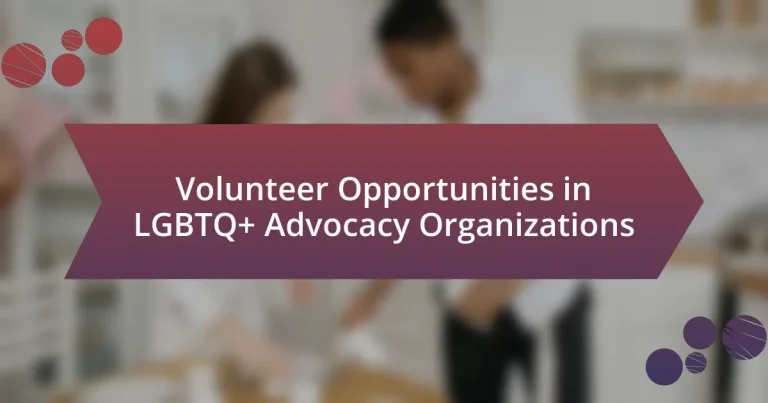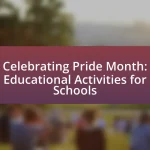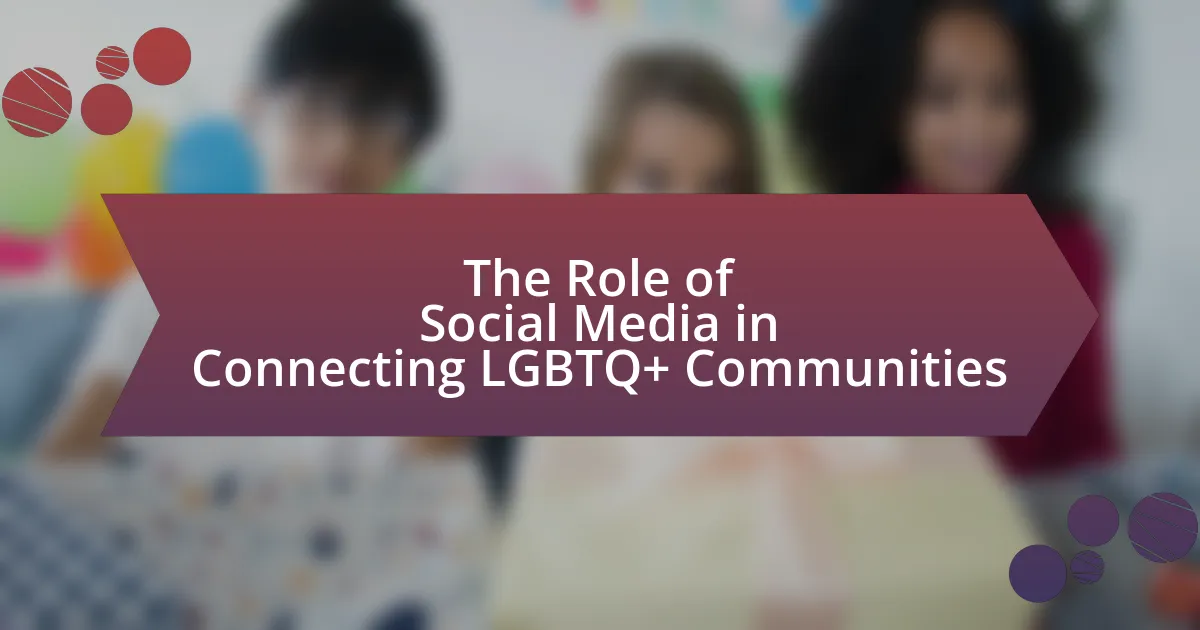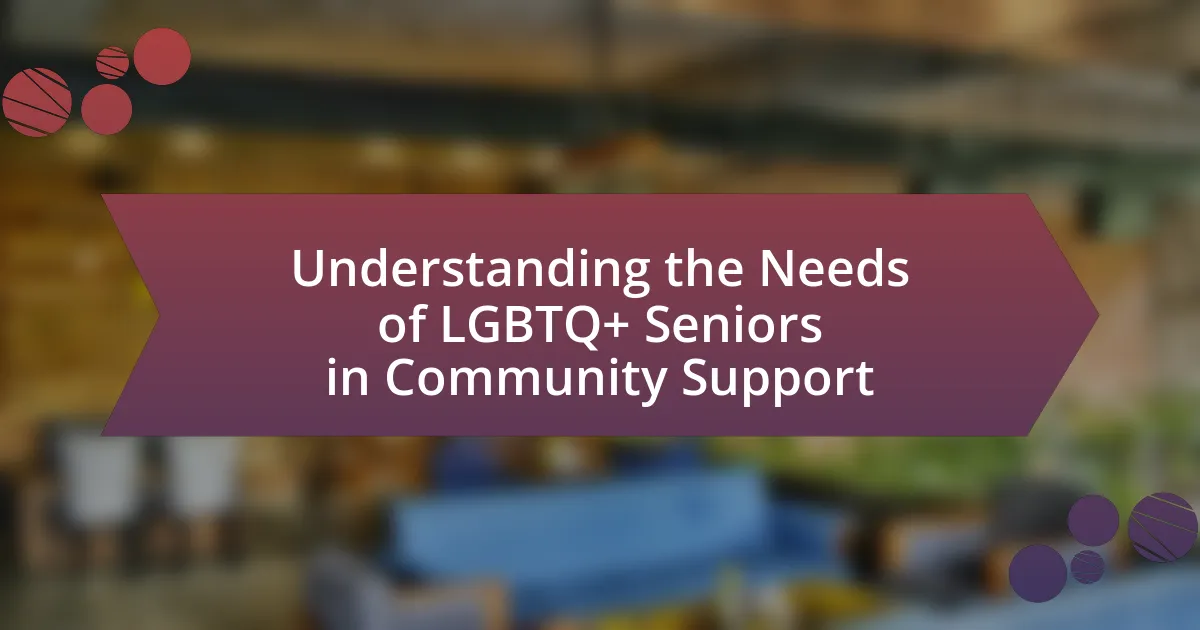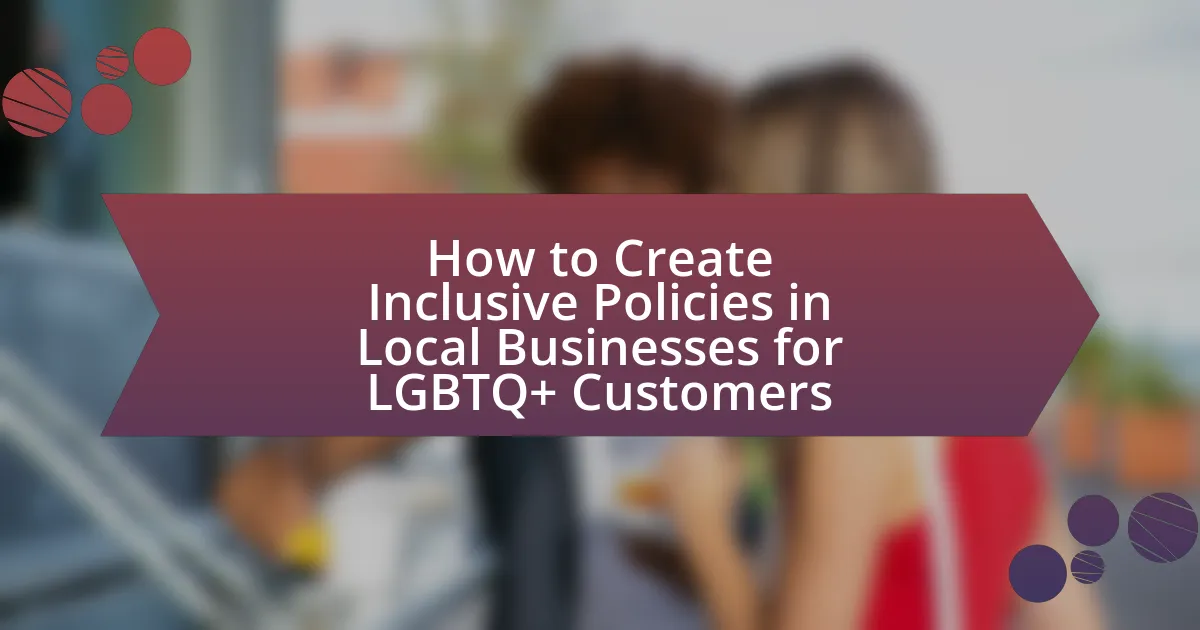Volunteer opportunities in LGBTQ+ advocacy organizations encompass various roles such as community outreach, event planning, fundraising, and educational program facilitation. These roles are essential for promoting awareness and support for LGBTQ+ rights, with organizations like the Human Rights Campaign and GLSEN actively recruiting volunteers to enhance their advocacy efforts. Volunteers contribute significantly to the LGBTQ+ community by providing resources, services, and representation, which directly address the needs of individuals. The article outlines the types of organizations offering these opportunities, the specific roles available, and the impact of volunteer work on local LGBTQ+ communities, emphasizing the importance of grassroots support in advancing equality and inclusivity.

What are Volunteer Opportunities in LGBTQ+ Advocacy Organizations?
Volunteer opportunities in LGBTQ+ advocacy organizations include roles such as community outreach, event planning, fundraising, and educational program facilitation. These organizations often seek volunteers to help with campaigns that promote awareness and support for LGBTQ+ rights, such as Pride events and health initiatives. For example, the Human Rights Campaign frequently recruits volunteers for local events and advocacy efforts, demonstrating the active involvement of community members in promoting equality. Additionally, organizations like GLSEN rely on volunteers to assist in creating safe school environments for LGBTQ+ youth, highlighting the critical need for grassroots support in advocacy work.
How do these volunteer opportunities support the LGBTQ+ community?
Volunteer opportunities in LGBTQ+ advocacy organizations support the community by providing essential resources, services, and representation. These opportunities enable volunteers to engage in activities such as outreach, education, and support services, which directly address the needs of LGBTQ+ individuals. For instance, organizations like The Trevor Project and GLSEN rely on volunteers to facilitate programs that promote mental health awareness and safe school environments for LGBTQ+ youth. Research indicates that community support significantly reduces mental health issues among LGBTQ+ individuals, highlighting the importance of these volunteer roles in fostering a supportive environment.
What specific roles can volunteers take on within these organizations?
Volunteers within LGBTQ+ advocacy organizations can take on roles such as outreach coordinators, event planners, educators, and support group facilitators. Outreach coordinators engage with the community to raise awareness about LGBTQ+ issues, while event planners organize activities and campaigns to promote advocacy efforts. Educators provide training and resources on LGBTQ+ topics, and support group facilitators lead discussions and offer emotional support to individuals in the community. These roles are essential for fostering inclusivity and advancing the mission of these organizations.
How do volunteers contribute to advocacy efforts?
Volunteers contribute to advocacy efforts by providing essential support in various capacities, including outreach, education, and mobilization. They engage communities by raising awareness about LGBTQ+ issues, facilitating workshops, and participating in events that promote inclusivity and equality. For instance, a study by the Human Rights Campaign found that volunteer-led initiatives significantly increased community participation in advocacy campaigns, demonstrating the effectiveness of grassroots efforts in influencing policy changes. Additionally, volunteers often help in organizing fundraising activities, which are crucial for sustaining advocacy programs and initiatives. Their involvement not only amplifies the message of advocacy organizations but also fosters a sense of community and solidarity among marginalized groups.
Why is volunteering important in LGBTQ+ advocacy?
Volunteering is crucial in LGBTQ+ advocacy because it mobilizes community support and resources to address discrimination and promote equality. Volunteers contribute their time and skills to raise awareness, provide support services, and influence policy changes that benefit LGBTQ+ individuals. For instance, organizations like The Trevor Project rely on volunteers to offer crisis intervention and suicide prevention services, which are vital given that LGBTQ+ youth are at a higher risk for mental health issues. Additionally, research from the Human Rights Campaign indicates that grassroots efforts led by volunteers have significantly advanced LGBTQ+ rights, demonstrating the tangible impact of volunteer involvement in creating social change.
What impact does volunteer work have on local LGBTQ+ communities?
Volunteer work significantly enhances local LGBTQ+ communities by providing essential support, resources, and advocacy. This engagement fosters a sense of belonging and empowerment among community members, as volunteers often help organize events, offer counseling, and create safe spaces. Research indicates that volunteerism in LGBTQ+ organizations leads to increased visibility and awareness of LGBTQ+ issues, which can result in improved mental health outcomes and social acceptance. For instance, a study published in the Journal of Community Psychology found that active participation in volunteer work correlates with higher levels of community cohesion and individual well-being among LGBTQ+ individuals.
How does volunteering promote awareness and education?
Volunteering promotes awareness and education by actively engaging individuals in community issues and fostering a deeper understanding of diverse perspectives. When volunteers participate in LGBTQ+ advocacy organizations, they gain firsthand experience with the challenges faced by the community, which enhances their knowledge and empathy. Research indicates that individuals who volunteer are more likely to become advocates for social change, as they are exposed to educational programs and discussions that highlight the importance of inclusivity and equality. For instance, a study by the Corporation for National and Community Service found that volunteers reported increased awareness of social issues and a greater commitment to civic engagement after their experiences. This direct involvement not only educates the volunteers but also helps disseminate information within their networks, further amplifying awareness in the broader community.

What types of LGBTQ+ advocacy organizations offer volunteer opportunities?
LGBTQ+ advocacy organizations that offer volunteer opportunities include community centers, legal aid organizations, health services, and educational nonprofits. Community centers often provide support services and host events, creating a need for volunteers to assist with programming and outreach. Legal aid organizations focus on providing legal assistance to LGBTQ+ individuals facing discrimination, requiring volunteers for administrative support and client outreach. Health services, such as clinics and mental health organizations, seek volunteers for patient support and educational initiatives. Educational nonprofits work to raise awareness and promote LGBTQ+ rights, often needing volunteers for advocacy campaigns and event planning. These organizations rely on volunteers to enhance their impact and reach within the community.
How do different organizations focus on various aspects of LGBTQ+ advocacy?
Different organizations focus on various aspects of LGBTQ+ advocacy by targeting specific issues such as legal rights, health care, education, and community support. For instance, the Human Rights Campaign primarily advocates for legal equality and policy changes, while organizations like the Trevor Project focus on mental health support and suicide prevention for LGBTQ+ youth. Additionally, groups like GLAAD work on media representation and combating discrimination in the entertainment industry. Each organization employs tailored strategies, such as lobbying for legislation, providing resources, and raising awareness, to address the unique challenges faced by the LGBTQ+ community. This multifaceted approach ensures comprehensive advocacy across different sectors, enhancing the overall effectiveness of LGBTQ+ rights movements.
What are the main categories of LGBTQ+ advocacy organizations?
The main categories of LGBTQ+ advocacy organizations include civil rights organizations, health-focused organizations, youth and education organizations, and community support organizations. Civil rights organizations, such as the Human Rights Campaign, focus on legal advocacy and policy change to secure equal rights for LGBTQ+ individuals. Health-focused organizations, like the Gay and Lesbian Medical Association, address health disparities and promote wellness within the LGBTQ+ community. Youth and education organizations, such as GLSEN, work to create safe and inclusive environments for LGBTQ+ youth in schools. Community support organizations, including local LGBTQ+ centers, provide resources and services to enhance the well-being of LGBTQ+ individuals and families. Each category plays a vital role in advancing the rights and well-being of the LGBTQ+ community.
How do these categories influence volunteer roles and responsibilities?
Categories such as advocacy, support services, and community outreach significantly influence volunteer roles and responsibilities within LGBTQ+ advocacy organizations. Volunteers engaged in advocacy may focus on policy change and awareness campaigns, while those in support services often provide direct assistance to individuals in need, such as counseling or legal aid. Community outreach volunteers typically work to connect with diverse populations, fostering inclusivity and awareness of LGBTQ+ issues. These distinct roles are shaped by the organization’s mission and the specific needs of the community, ensuring that volunteers are effectively utilized based on their skills and interests. For instance, a study by the Human Rights Campaign highlights that targeted volunteer roles enhance organizational effectiveness and community impact, demonstrating the importance of aligning volunteer responsibilities with the organization’s strategic goals.
What are some examples of well-known LGBTQ+ advocacy organizations?
Some examples of well-known LGBTQ+ advocacy organizations include the Human Rights Campaign, GLAAD, and the Trevor Project. The Human Rights Campaign, founded in 1980, is the largest LGBTQ+ advocacy group in the United States, focusing on civil rights and equality. GLAAD, established in 1985, works to promote LGBTQ+ representation in media and combat discrimination. The Trevor Project, founded in 1998, provides crisis intervention and suicide prevention services to LGBTQ+ youth. These organizations are recognized for their significant contributions to advancing LGBTQ+ rights and awareness.
What volunteer opportunities do these organizations typically offer?
LGBTQ+ advocacy organizations typically offer volunteer opportunities such as community outreach, event planning, educational workshops, and support services. These roles allow volunteers to engage directly with the LGBTQ+ community, promote awareness, and provide resources. For instance, organizations often seek volunteers to assist in organizing pride events, conducting training sessions on LGBTQ+ issues, or providing peer support to individuals in need. Such opportunities not only foster community involvement but also contribute to the overall mission of promoting equality and support for LGBTQ+ individuals.
How can volunteers find these organizations in their area?
Volunteers can find LGBTQ+ advocacy organizations in their area by utilizing online resources such as local community directories, social media platforms, and volunteer matching websites. Websites like VolunteerMatch and Idealist allow users to search for organizations based on location and specific interests, including LGBTQ+ advocacy. Additionally, local LGBTQ+ centers often maintain lists of affiliated organizations and volunteer opportunities. According to a 2021 report by the Human Rights Campaign, over 1,500 LGBTQ+ organizations exist across the United States, making it feasible for volunteers to locate nearby options through these platforms.

How can individuals get involved in volunteering for LGBTQ+ advocacy?
Individuals can get involved in volunteering for LGBTQ+ advocacy by reaching out to local LGBTQ+ organizations and offering their time and skills. Many organizations, such as The Trevor Project and Human Rights Campaign, actively seek volunteers for various roles, including event planning, outreach, and support services. According to a 2021 report by the Movement Advancement Project, over 1,500 LGBTQ+ organizations exist in the United States, providing numerous opportunities for individuals to contribute to advocacy efforts. Engaging in community events, participating in training sessions, and joining advocacy campaigns are effective ways to support LGBTQ+ rights and visibility.
What steps should someone take to start volunteering?
To start volunteering, an individual should first identify their interests and the causes they are passionate about, particularly within LGBTQ+ advocacy organizations. Next, they should research local organizations that align with those interests, such as LGBTQ+ community centers or advocacy groups. After identifying potential organizations, the individual should reach out to them to inquire about volunteer opportunities, which may include attending an orientation session or filling out a volunteer application. Engaging in training sessions offered by the organization is also essential to understand their mission and how to contribute effectively. According to a report by the National LGBTQ Task Force, volunteering not only supports the community but also enhances personal growth and networking opportunities.
How can potential volunteers assess their skills and interests?
Potential volunteers can assess their skills and interests by conducting a self-inventory that includes evaluating past experiences, identifying personal strengths, and reflecting on passions related to LGBTQ+ advocacy. This process involves listing skills such as communication, organization, or leadership, and matching them with specific roles within advocacy organizations, such as outreach, event planning, or education. Research indicates that self-assessment tools, like the Skills Inventory and Interest Inventory, can effectively guide individuals in recognizing their capabilities and aligning them with volunteer opportunities, enhancing both personal fulfillment and organizational impact.
What resources are available for finding volunteer opportunities?
Online platforms such as VolunteerMatch, Idealist, and local nonprofit websites are key resources for finding volunteer opportunities. VolunteerMatch connects individuals with organizations based on interests and location, featuring over 100,000 volunteer opportunities across various causes. Idealist offers a comprehensive database of volunteer roles, internships, and jobs in the nonprofit sector, making it easier for individuals to engage with organizations that align with their values. Additionally, local LGBTQ+ advocacy organizations often list volunteer opportunities on their websites or social media pages, providing direct access to community-specific initiatives.
What are some best practices for effective volunteering in LGBTQ+ advocacy?
Effective volunteering in LGBTQ+ advocacy involves understanding the community’s needs, actively listening, and engaging in inclusive practices. Volunteers should educate themselves on LGBTQ+ issues, including the history of the movement and current challenges, to provide informed support. Building relationships with community members fosters trust and collaboration, which are essential for impactful advocacy. Additionally, participating in training sessions offered by organizations enhances skills and awareness, ensuring that volunteers can contribute meaningfully. Research indicates that organizations with well-trained volunteers are more effective in achieving their advocacy goals, as they can better navigate complex social dynamics and provide relevant support.
How can volunteers ensure they are making a positive impact?
Volunteers can ensure they are making a positive impact by aligning their efforts with the specific needs of LGBTQ+ advocacy organizations. This involves actively engaging with the organization to understand its goals, participating in training sessions, and utilizing their skills effectively. Research indicates that targeted volunteer efforts can lead to increased organizational effectiveness; for instance, a study by the Corporation for National and Community Service found that well-trained volunteers can enhance service delivery by up to 30%. By focusing on the organization’s mission and measuring outcomes, volunteers can contribute to meaningful change within the community.
What common challenges do volunteers face, and how can they overcome them?
Volunteers in LGBTQ+ advocacy organizations commonly face challenges such as emotional burnout, lack of resources, and difficulties in communication. Emotional burnout occurs due to the intense nature of advocacy work, which can lead to fatigue and decreased motivation. To overcome this, volunteers can establish support networks among peers, engage in self-care practices, and set realistic goals to manage their emotional well-being.
Lack of resources, including funding and materials, can hinder the effectiveness of volunteer efforts. Volunteers can address this challenge by collaborating with other organizations to share resources, seeking grants, or organizing fundraising events to secure necessary support.
Communication difficulties often arise from diverse backgrounds and experiences within the LGBTQ+ community. Volunteers can improve communication by participating in training sessions focused on inclusivity and cultural competency, fostering an environment of understanding and respect.
These strategies can help volunteers navigate the common challenges they face while contributing effectively to LGBTQ+ advocacy efforts.
What are the benefits of volunteering in LGBTQ+ advocacy organizations?
Volunteering in LGBTQ+ advocacy organizations provides numerous benefits, including personal growth, community impact, and skill development. Individuals gain a deeper understanding of LGBTQ+ issues, fostering empathy and awareness, which can lead to increased social responsibility. Additionally, volunteers contribute to meaningful change by supporting initiatives that promote equality and acceptance, directly impacting the lives of marginalized individuals. Skills such as leadership, communication, and teamwork are enhanced through active participation in advocacy efforts, making volunteers more competitive in the job market. Research indicates that volunteering can also improve mental health and well-being, as individuals often experience a sense of purpose and fulfillment from their contributions to social justice.
How does volunteering enhance personal growth and community connection?
Volunteering enhances personal growth and community connection by fostering skills such as empathy, leadership, and teamwork while simultaneously building relationships within the community. Engaging in volunteer work, particularly in LGBTQ+ advocacy organizations, allows individuals to confront social issues, develop a deeper understanding of diverse perspectives, and cultivate a sense of belonging. Research indicates that volunteers report higher levels of life satisfaction and well-being, with a study published in the Journal of Happiness Studies showing that volunteering can lead to a 27% increase in happiness levels. This engagement not only benefits the individual but also strengthens community ties, as volunteers contribute to a shared mission and support marginalized groups, creating a more inclusive environment.
What skills can volunteers develop through their experiences?
Volunteers can develop a variety of skills through their experiences, including communication, teamwork, leadership, and problem-solving. These skills are cultivated as volunteers engage with diverse groups, collaborate on projects, and navigate challenges within LGBTQ+ advocacy organizations. For instance, effective communication is essential when conveying messages to the community or advocating for policy changes, while teamwork is crucial for working alongside other volunteers and staff to achieve common goals. Leadership skills are often enhanced as volunteers take initiative in organizing events or leading discussions, and problem-solving abilities are sharpened through addressing the unique challenges faced by the LGBTQ+ community.
What tips can help new volunteers succeed in LGBTQ+ advocacy roles?
New volunteers can succeed in LGBTQ+ advocacy roles by actively educating themselves about LGBTQ+ issues and community needs. Understanding the history, challenges, and rights of LGBTQ+ individuals enhances a volunteer’s ability to advocate effectively. For instance, familiarizing oneself with key legislation, such as the Equality Act, and current events affecting the LGBTQ+ community provides context for advocacy efforts. Additionally, building relationships with community members and organizations fosters collaboration and trust, which are essential for impactful advocacy. Engaging in training sessions and workshops offered by established LGBTQ+ organizations can also equip volunteers with necessary skills and knowledge. Research indicates that informed volunteers are more effective in their roles, as they can communicate persuasively and empathetically, ultimately leading to greater advocacy success.
